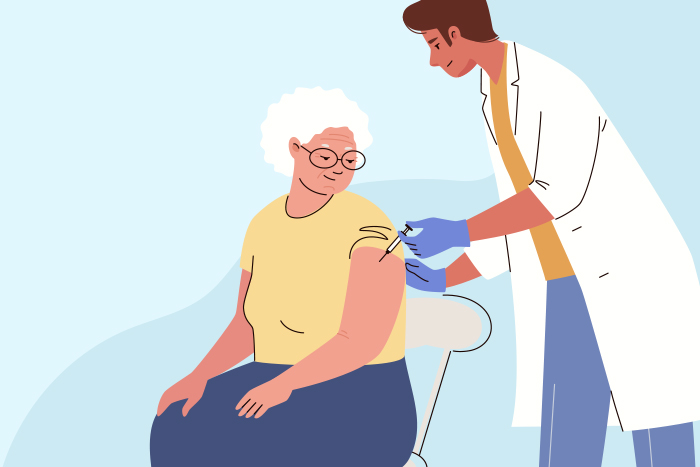Stay Current on Immunizations to Stay Healthy
Our immune systems naturally get weaker as we age. That means it’s easier to catch certain illnesses—and harder to recover from them. But the good news is that vaccines can help protect you.
Immunizations are a simple and powerful way to stay healthy. They lower your risk of getting sick, help keep you out of the hospital, and give you peace of mind during flu season and beyond.
Here are the vaccines most older adults should know about, and what to expect with each.
Flu (Influenza) Vaccine
What It Protects Against: The flu can be dangerous at any age—but especially for people 65 and older. It can lead to serious problems like pneumonia, hospitalization, or even death.
How It’s Given: One shot in the arm, usually in the fall.
How Often: Once a year.
Things to Know: Ask for the high-dose or adjuvanted version made specifically for older adults. These help your immune system build better protection. If you're allergic to eggs, talk with your doctor—egg-free versions are available.
COVID-19 Vaccine
What It Protects Against: COVID-19 is still a risk for seniors. The vaccine helps prevent severe illness and lowers the chance of being hospitalized.
How It’s Given: One shot in the arm for most people, depending on your last dose.
How Often: A new COVID-19 shot is released each fall, just like the flu shot.
Things to Know: The latest vaccines are updated to protect against the most common versions of the virus. If you have a weakened immune system or certain health problems, talk to your doctor about when and how often you should be vaccinated.
Pneumonia Vaccine
What It Protects Against: Pneumococcal bacteria can cause serious infections like pneumonia, meningitis, and bloodstream infections. These can be life-threatening for older adults.
How It’s Given: One or two shots, depending on your history and health.
How Often: Most people need one dose after age 65. Some may need a second dose a year later.
Things to Know: There are two main types: PCV20 and PCV15, sometimes followed by PPSV23. Your doctor will help you choose the right one.
Shingles (Herpes Zoster) Vaccine
What It Protects Against: Shingles is a painful rash that can happen after age 50 if you had chickenpox as a child. It can cause nerve pain that lasts for months.
How It’s Given: Two shots in the arm, spaced 2-6 months apart.
How Often: Just once—this 2-dose series protects you for many years.
Things to Know: The shingles vaccine is called Shingrix. It’s recommended for everyone 50 and older, even if you’ve had shingles before. If you’re allergic to the ingredients or had a bad reaction before, your doctor may recommend skipping it.
Tetanus, Diphtheria, and Pertussis (Tdap or Td)
What It Protects Against: Tetanus (a bacterial infection), diphtheria, and pertussis (also called whooping cough). These can still affect adults and be serious.
How It’s Given: One shot in the arm.
How Often: A booster shot every 10 years.
Things to Know: If you’re caring for a baby or grandchild, it’s important to be up to date, since whooping cough can be passed on easily and can be especially dangerous to infants and young children.
Who should not get certain vaccines?
Most vaccines are safe for older adults. But there are a few exceptions. You may be told to delay or skip a vaccine if you:
Have a severe allergy to any part of the vaccine
Had a serious reaction to a past dose
Have a weakened immune system due to illness or medications
Are currently very sick with a fever
Your doctor or pharmacist can help you understand what’s safe for your personal health history.
How to Stay on Schedule
It can be hard to remember which vaccines you’ve had, especially when some are only needed once every few years. That’s why it helps to:
Keep a list of your past shots
Ask your doctor or pharmacist to review your vaccine record
Mark your calendar for yearly vaccines like flu and COVID
You can also bring up vaccines during your Medicare wellness visit or annual physical. It’s a great time to catch up on preventative care.
A Simple Step Toward a Safer Season
Vaccines are one of the easiest ways to protect your health as you get older. They don’t take much time, but they can help prevent serious illness, keep you out of the hospital, and make you feel more confident around others.
If you haven’t had one of these shots recently, now is a great time to ask your doctor or local pharmacy. Staying current on vaccines is part of staying independent—and staying healthy.
Sources:
Centers for Disease Control and Prevention: https://www.cdc.gov/vaccines/by-age/
Mayo Clinic: https://www.mayoclinic.org/healthy-lifestyle/adult-health/in-depth/vaccines/art-20046750
U.S. Department of Health and Human Services: https://www.vaccines.gov/en/
Mayo Clinic: https://www.mayoclinic.org/diseases-conditions/shingles/expert-answers/shingles-vaccine/faq-20057859

